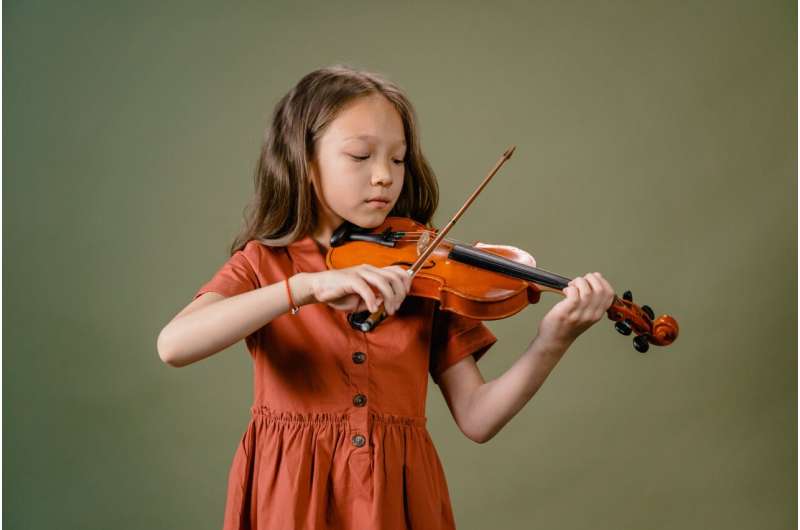This article has been reviewed according to Science X's editorial process and policies. Editors have highlighted the following attributes while ensuring the content's credibility:
fact-checked
trusted source
proofread
Understanding music-performance anxiety in children

Do music pupils in primary school suffer from performance anxiety?
To find out, researchers at three Quebec universities studied 164 children aged 9 to 12 enrolled in an intensive music program at their school, and they discovered that the girls were more anxious than the boys.
The researchers—Catherine Tardif, a doctoral student and lecturer in the Faculty of Education at Université de Montréal; Hélène Boucher and Audrey-Kristel Barbeau, professors of music education at Université du Québec à Montréal; and Julie Lane, a professor of education at Université de Sherbrooke—used an American performance-anxiety questionnaire that they translated into French.
It is the first time the questionnaire has been used with elementary school children in a music program.
Children who play the violin, piano, cello or other instruments were asked to report the frequency and intensity of physical manifestations of anxiety, such as butterflies in the stomach before a concert, clammy hands, heart palpitations and trembling.
The students were also asked whether they experienced feelings such as "I'm afraid my parents or teacher won't like my playing," or conversely, "After a recital, I'm usually satisfied with my playing."
Worried about making mistakes
Girls were 10 percentage points more likely than boys to experience anxiety about their musical performance, the survey revealed. They were particularly anxious about their ability to perform in public, making mistakes in front of an audience, and panicking after making a mistake during a performance.
The researchers hypothesize that the girls may have a greater desire to please than boys do, or have higher expectations of their own performance.
"Some sources suggest that girls are more attuned to their manifestations of anxiety and more likely to report them than boys," said Tardif. "One way to test this hypothesis would be to look for biological data to corroborate the self-reports."
Anxiety levels also varied according to whether it was the child or the parent who wanted the child to take music. Younger students reported significantly less performance anxiety when they themselves had asked to enroll in the intensive music program. However, this only applied to the fourth-graders.
Surprisingly, the opposite was true in grades 5 and 6: The students who had originally chosen the program themselves reported increased anxiety, while those who had been enrolled by their parents reported less anxiety than the grade 4 students.
"Music performance anxiety is related to how seriously the child takes things, to their expectations of themselves," said Tardif. "If practicing their instrument becomes very important to them as they get older, their bar for success is likely to be higher and their performance anxiety is liable to increase. It's different for a child who entered the program just to meet their parents' expectations."
Nervous about being judged
Performance anxiety is caused by having very high expectations of oneself. It is a subcategory of social anxiety in the American Psychiatric Association's DSM-5, the "bible" for psychiatric diagnoses. For elementary school students, raising one's hand in class or speaking in front of others may create performance anxiety. They are nervous about being the center of attention and being judged by others.
"A student who suffers from performance anxiety will set their own bar for success," explained Tardif. "It varies from child to child; some want to get A+ all the time, while for others it's C+." The anxiety comes from the standards of success the children have set for themselves.
In music performance, "a student suffering from anxiety might say 'I hit the wrong note' and if you tell them the audience didn't notice, it's no consolation," said Tardif. "They'll say 'Yes, but at home I get it right and in front of the audience, I messed up.' They will cling to the expectations they have set for themselves: in this case, to perform the piece flawlessly, just like at home."
The study sheds light on how the impact of external expectations can change in the course of a child's development, the researchers say. At an early age, children attach great importance to their parents' expectations. As they grow older, their identities take shape and what they care about may be less closely aligned with their parents' priorities.
Provided by University of Montreal





















